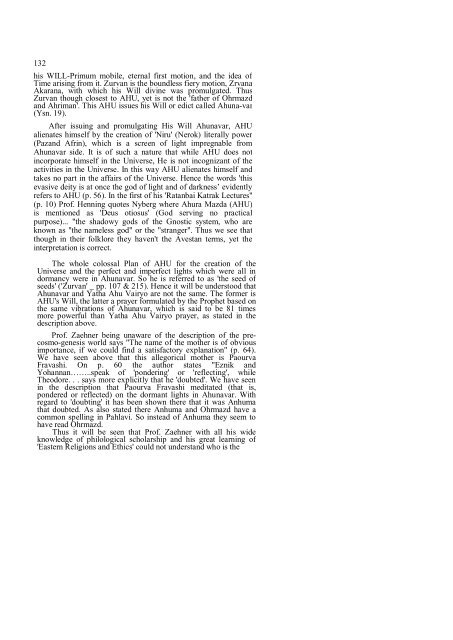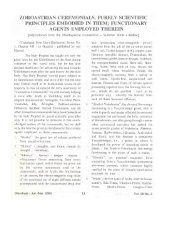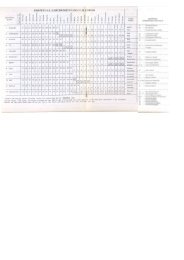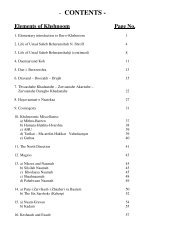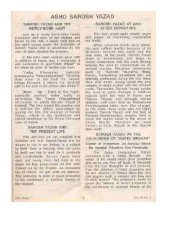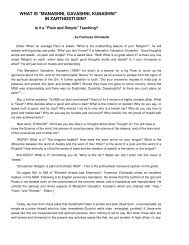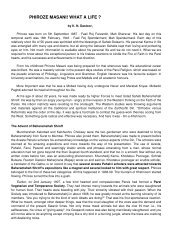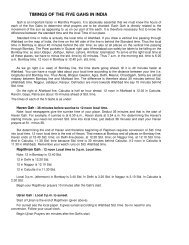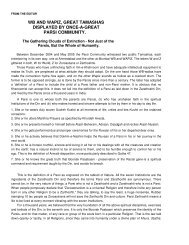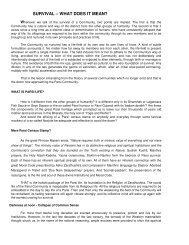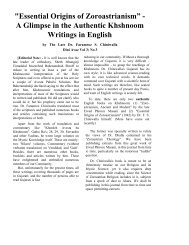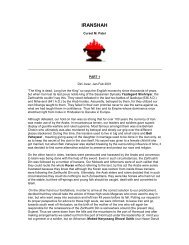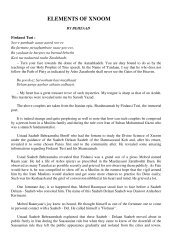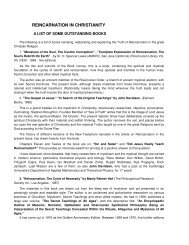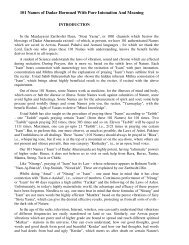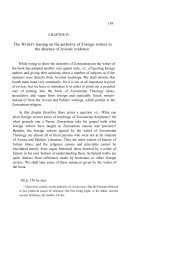- Page 1 and 2:
A MANUAL OF "KHSHNOOM" THE ZOROASTR
- Page 3 and 4:
Study of Khshnoom Would Help and Em
- Page 5 and 6:
2 CHAPTER III Misconceptions about
- Page 7 and 8:
4 Niru, the Screen of Light between
- Page 9 and 10:
6 "Miswane-Gatu, intermediate regio
- Page 11 and 12:
8 SUPPLEMENT NO. 10 References to K
- Page 13 and 14:
10 SUPPLEMENT NO. 23 Technical Sign
- Page 15 and 16:
12 Angelic powers of Zarathushtra 3
- Page 17 and 18:
14 Numerological significances of I
- Page 19 and 20:
1. Hormazd Yasht 2. Haptan Yasht or
- Page 21 and 22:
PROLOGUE The author of this book pa
- Page 23 and 24:
happen. Is it possible in this scie
- Page 25 and 26:
5 drama of existence.’ Man is thu
- Page 27 and 28:
SPECIAL FEATURES OF THIS BOOK (show
- Page 29 and 30:
PREFACE _ Since many years past I w
- Page 31 and 32:
11 given in a succinct and lucid la
- Page 33 and 34:
13 offer most reverently my deepest
- Page 35 and 36:
INTRODUCTION The condition of the P
- Page 37 and 38:
17 coupled with the spiritual disci
- Page 39 and 40:
19 motionless AHU displays intense
- Page 41 and 42:
21 genuine Zoroastrian teaching is
- Page 43 and 44:
23 in the Universe. They are ordina
- Page 46 and 47:
THE UNIVERSE First Stage of the Ahu
- Page 48 and 49:
After being classified as above, so
- Page 50 and 51:
Khaetvadatha blends two counterpart
- Page 52 and 53:
31 material world remains unpopulat
- Page 54 and 55:
33 instead of 300. So 269 x 27 = 7,
- Page 56 and 57:
36 J information on the religious a
- Page 58 and 59:
CHAPTER II PHILOLOGICAL STUDY OF ZE
- Page 60 and 61:
40 language which he does not under
- Page 62 and 63:
(Avesta) Vol. IV Vol. XXIII Vol. XX
- Page 64 and 65:
44 the priestly class to study thei
- Page 66 and 67:
46 EXTANT AVESTA REMNANTS OF NASKS
- Page 68 and 69:
48 'tree' is used in an allegorical
- Page 70 and 71:
50 Among the various powers gained
- Page 72 and 73:
52 Going back to Manthra Spenta, th
- Page 74 and 75:
CHAPTER IV PHILOLOGICAL STUDY OF AV
- Page 76 and 77:
57 the community. But the dark side
- Page 78 and 79:
BEHRAMSHAH REACHES PESHAWAR 59 Thus
- Page 80 and 81:
61 of your religion?" And so on, wh
- Page 82 and 83:
THE HOLY "SAHEB-DILAN" (MASTER-HEAR
- Page 84 and 85:
65 Zoroastrian religion in its pris
- Page 86 and 87:
SRAOSHAVAREZ MARZBAN SAHEB, THE HOL
- Page 88 and 89:
69 used to say that some 5,000 year
- Page 90 and 91:
71 by disciple from his Master impa
- Page 92 and 93:
73 The soul that has advanced to th
- Page 94 and 95:
75 'the' most abstruse subjects ext
- Page 96 and 97:
77 The Arab alchemists carried thei
- Page 98 and 99:
CHAPTER VII MASTER'S LIFE IN PUBLIC
- Page 100 and 101: 81 'Parsi Vegetarian and Temperance
- Page 102 and 103: 83 proficient in both the branches
- Page 104 and 105: 85 realize that instead of taking h
- Page 106 and 107: -Khshnoom, an ardent learner must a
- Page 108 and 109: 89 ous worlds. In other words, thes
- Page 110 and 111: 91 "I was and am too anxious to kno
- Page 112 and 113: THE IMPORTANCE GIVEN TO MR. BEHRAMS
- Page 114 and 115: CHAPTER IX "KEY" NO. I Description
- Page 116 and 117: 97 KHAO AFRAZYAMNA, THE FOUNTAIN-SO
- Page 118 and 119: '" 99 Time and Space. Thus it is th
- Page 120 and 121: 101 of Renovation. It will thus be
- Page 122 and 123: 103 mentioned above, which Vacha is
- Page 124 and 125: 105 'Anghu-Paourva', the pre-cosmo-
- Page 126 and 127: 107 prayer have special significanc
- Page 128 and 129: 109 pre-cosmo-ge!nesis world for ca
- Page 130 and 131: 111 "Chithra" - Anhuma -- Seed or '
- Page 132 and 133: 113 IS, I am nothing" - was in Nada
- Page 134 and 135: 115 without in effecting the creati
- Page 136 and 137: 117 concerned. These three classes
- Page 138 and 139: A DERIVATIVE OR A SPECULATIVE CONNO
- Page 140 and 141: 121 Fravashis showered their Manthr
- Page 142 and 143: 123 is allegorically regarded as th
- Page 144 and 145: 125 the Creation was effected by Oh
- Page 146 and 147: CHAPTER XI ELUCIDATION OF "ZERVANIT
- Page 148 and 149: 129 In the whole of the above fabri
- Page 152 and 153: 133 mother of Ohrmazd and Ahriman,
- Page 154 and 155: 136 as Urvan of Manthra-Spenta, the
- Page 156 and 157: 138 "The unfoldment of a soul is a
- Page 158 and 159: 140 cription accompanying the soul
- Page 160: 142 Almost all the above mentioned
- Page 163 and 164: 144 called a "Zamrir" between a pai
- Page 165 and 166: 146 The heavens of the Sun and the
- Page 167 and 168: 148 the latter to devour, its oppon
- Page 169 and 170: 150 COMMUNION OF CHILD WITH NATURE
- Page 171 and 172: 152 THREE STAGES OF 'THWASHA KHADAT
- Page 173 and 174: 154 souls that are scattered about
- Page 175 and 176: 156 visible body) (Ysn. 155,1) expr
- Page 177 and 178: 158 means the serpent representing
- Page 179 and 180: 160 because from its top sub-region
- Page 181 and 182: 162 The terms 'Rastakheez, and 'Tan
- Page 183 and 184: 164 around this Khanirath Bami keep
- Page 185 and 186: CHAPTER XIII IRRELEVANT AND STRANGE
- Page 187 and 188: 168 three technical terms. Of cours
- Page 189 and 190: 170 covering the head and wearing t
- Page 191 and 192: 172 from its derivatives, are not a
- Page 193 and 194: Fire No. g Fire-energies Functionin
- Page 195 and 196: 177 heat, while Ataremcha-Ahurahe-M
- Page 197 and 198: 179 gaining His divine vision could
- Page 199 and 200: SUPPLEMENT NO.2 TECHNICAL SIGNIFICA
- Page 201 and 202:
183 unto me". "Salar-e daman" means
- Page 203 and 204:
185 belonged to this Subut class. W
- Page 205 and 206:
SUPPLEMENT NO.5 Suffix 'Khadata' ex
- Page 207 and 208:
189 position that it is a technical
- Page 209 and 210:
191 man. The balance 0.1 is again d
- Page 211 and 212:
SUPPLEMENT NO. 8 A Few Instances of
- Page 213 and 214:
Channels Pillars Conflict (yaokhedr
- Page 215 and 216:
group 12,000 (12 = 1 plus 2 ==) 3 i
- Page 217 and 218:
199 to a slight rise in temperature
- Page 219 and 220:
201 event to which all the Creation
- Page 221 and 222:
203 Darkness, and hence cannot be f
- Page 223 and 224:
205 Vikhiz, the ascension of his so
- Page 225 and 226:
207 Whenever owing to the influence
- Page 227 and 228:
209 GEUSH URVA AND GEUSH TASHAN COU
- Page 229 and 230:
211 i) The Avesta word "Geush" whic
- Page 231 and 232:
213 by the king or hero concerned.
- Page 233 and 234:
SUPPLEMENT NO. 13 CONVERSION OF ETH
- Page 235 and 236:
SUPPLEMENT NO. 14 KHANIRATH BAMI, T
- Page 237 and 238:
SUPPLEMENT NO. 15 CLASSIFICATION OF
- Page 239 and 240:
SUPPLEMENT NO. 16 MYSTIC POWERS OF
- Page 241 and 242:
223 in the atmosphere created by th
- Page 243 and 244:
225 powerful than the black-magic s
- Page 245 and 246:
227 Thus it will be noticed that Ga
- Page 247 and 248:
229 of the zodiac, and transferred
- Page 249 and 250:
231 ". . . a religion whose followe
- Page 251 and 252:
233. their, state of deficiency of
- Page 253 and 254:
235 MAN. He was the only one who la
- Page 255 and 256:
237 mediate region between the heav
- Page 257 and 258:
239 longing to the senses are activ
- Page 259 and 260:
241 (translation) - Which seven (Am
- Page 261 and 262:
SUPPLEMENT NO. 22 'KAR MAHI' THE AL
- Page 263 and 264:
245 Zantu (literally town) refers t
- Page 265 and 266:
247 Still there exists great differ
- Page 267 and 268:
249 by 21 different types of Druji
- Page 269 and 270:
251 band, bind; hence binding or un
- Page 271 and 272:
253 it was that Zoroaster had came
- Page 273 and 274:
'255 of our Master, the learned Mr.
- Page 275 and 276:
257 (c) with these life-energies is
- Page 277 and 278:
Inlaid; which when he willed the- d
- Page 279 and 280:
261 by the mode of opposition (Jooz
- Page 281 and 282:
(1) Life of Zarathushtra. (2) Date
- Page 283 and 284:
266 coits, etc. Thus till the adven
- Page 285 and 286:
268 born. Here on this plateau flow
- Page 287 and 288:
270 Supreme King of the sacred bein
- Page 289 and 290:
272 attracted to the worship of Ahu
- Page 291 and 292:
274 5. devoured by serpents 6. Seve
- Page 293 and 294:
276 'Dareji-Zabar' where there was
- Page 295 and 296:
278 In par. 62 there is reference t
- Page 297 and 298:
280 and 2) it affords protection. H
- Page 299 and 300:
282 understand why Zarathushtra sho
- Page 301 and 302:
284 of life. But when both the skin
- Page 303 and 304:
286 foundations for other Faiths to
- Page 305 and 306:
288 wisdom will cease to exist on t
- Page 307 and 308:
290 that after the shattering of th
- Page 309 and 310:
292 a life of marauders and of dest
- Page 311 and 312:
294 steed' parable is said to have
- Page 313 and 314:
296 (73) One of the miracles attrib
- Page 315 and 316:
298 his spirit may become exalted a
- Page 317 and 318:
300 This is also mentioned in "Zoro
- Page 319 and 320:
302 GRADATIONS OF DIVINE INTELLIGEN
- Page 321 and 322:
304 NAME ZARATHUSHTRA The name Zara
- Page 323 and 324:
306 deficient in divine knowledge c
- Page 325 and 326:
308 intrusted with (its) protection
- Page 327 and 328:
310 body like archangels, or assume
- Page 329 and 330:
312 Hvovi: Hvovi (Yt, 13,139) 1iter
- Page 331 and 332:
314 Lake Kansava is referred to in
- Page 333 and 334:
316 Zarathushtra's Passing Away by
- Page 335 and 336:
318 called Tur-bara-Tur. Zarathusht
- Page 337 and 338:
PROLOGUE The subject of the Era of
- Page 339 and 340:
INTRODUCTION The controversy over t
- Page 341 and 342:
326 to revise our ideas about the a
- Page 343 and 344:
328 These distant dates have been g
- Page 345 and 346:
330 The name of Huafrit appears in
- Page 347 and 348:
332 of old, or of the historical ch
- Page 349 and 350:
334 posed and refuted, and the dark
- Page 351 and 352:
336 Bahman, the son of the latter,
- Page 353 and 354:
338 hence the attention of the scho
- Page 355 and 356:
340 observations through spiritual
- Page 357 and 358:
342 the era of Zarathushtra as much
- Page 359 and 360:
CHAPTER II Clues furnished by our M
- Page 361 and 362:
346 "After the subversion by the Ar
- Page 363 and 364:
348 ferred to by Dr. Modi in the bo
- Page 365 and 366:
350 Hence Berosus must have reporte
- Page 367 and 368:
352 idolatry gained strength on the
- Page 369 and 370:
354 "As the planets transit through
- Page 371 and 372:
_ 356 tion of that Plan by the Sun.
- Page 373 and 374:
358 NUMEROLOGICAL SIGNIFICANCES OF
- Page 375 and 376:
360 (5) Since the commencement of t
- Page 377 and 378:
362 The period of a minister cycle
- Page 379 and 380:
364 Ready-Reckoner Chart A Ready-Re
- Page 382 and 383:
366 METHOD OF "SHUMAR-I-FALAK" APPL
- Page 384 and 385:
368 It will thus be noticed that th
- Page 386 and 387:
371 and vegetable life. However, be
- Page 388 and 389:
373 "Dr. Rapp has justly remarked t
- Page 390 and 391:
375 shining shore whence Maapadians
- Page 392 and 393:
377 distinctions of the two sexes w
- Page 394 and 395:
379 Therefore, the period made up o
- Page 396 and 397:
381 Numerological Significances of
- Page 398 and 399:
383 full glory', and by the perform
- Page 400 and 401:
385 but he has also devised machine
- Page 402 and 403:
387 in the Jarthoshti Daena is "Ata
- Page 404 and 405:
389 "After Gayomard at different pe
- Page 406 and 407:
39] grade, was seen giving twists t
- Page 408 and 409:
393 preparation, and after a certai
- Page 410 and 411:
395 Then by the method of Maktubi,
- Page 412 and 413:
397 goblet and taught to drink the
- Page 414 and 415:
399 come in contact with other pers
- Page 416 and 417:
401 Respecting the condition of pro
- Page 418 and 419:
403 evolved'; "it is the most insan
- Page 420 and 421:
405 The making of a Sudreh must be
- Page 422 and 423:
407 energy and colour. The Holy Pro
- Page 424 and 425:
409 confession and of the load of t
- Page 426 and 427:
411 In the above instance, Firdousi
- Page 428 and 429:
VEIL OF DARKNESS 413 Owing to the b
- Page 430 and 431:
415 invisible plexus operating on t
- Page 432 and 433:
'Ramano Khastrahe' Electro Magnetic
- Page 434 and 435:
419 The term 'Kusti', the Zoroastri
- Page 436 and 437:
Property of Woolen Fibres Employed
- Page 438 and 439:
" 423 This unification of the two t
- Page 440 and 441:
425 of Darkness" in chapter VII). P
- Page 442 and 443:
427 Gahambars (growths or stages),
- Page 444 and 445:
429 lengths (of the Kusti) is done
- Page 446 and 447:
431 It is just to attribute to the
- Page 448 and 449:
433 According to Mohammedan writers
- Page 450 and 451:
Ilm-i-Khshnum Series No.1 Bird's ey
- Page 452 and 453:
Zoroastrianism, Ancient & Modern Ra
- Page 454 and 455:
Ādar-e Vohufryanē Kasif (lower) }
- Page 456 and 457:
Anāmāthvāo 131 Anāmānthvāo Al
- Page 458 and 459:
Ātash Dādgāh 180, 386 Ātash-e-D
- Page 460 and 461:
Bhagwān 103 Bharucha S. D. Ervad 1
- Page 462 and 463:
Dāiti 276 Dāitya 276, 286 Dakhyus
- Page 464 and 465:
Dugdaub (Dughdaub) 276, 278, 275, 2
- Page 466 and 467:
Gang-i-Shapigan 345 Ganjisi 386 Gao
- Page 468 and 469:
Hararat-e-Gerezia } } 257 Harārat-
- Page 470 and 471:
Ilm-i-Khshnum, Series No. 1, 10, 18
- Page 472 and 473:
Kavaem Khareno 184, 223, 284, 390,
- Page 474 and 475:
Kingly glory 390 Khyaonians 297, 29
- Page 476 and 477:
Margarjan 156, 219, 220 Markaz 268,
- Page 478 and 479:
Naba-nazdishta (-nam) 49, 138, 208,
- Page 480 and 481:
Patet Pashēmani 48, 219, 240, 302
- Page 482 and 483:
Sachkār 285 Sadar-o-Mukhkar 395 Sa
- Page 484 and 485:
Srit (Sreet) 307, 316, 371 Staora 1
- Page 486 and 487:
Urvans 20, 21, 26, 108 to 113, 118
- Page 488 and 489:
Wahēd-ē-Hakiki 101, 106, 261 Wate
- Page 490 and 491:
Zaehner, Prof. 7, 9, 27, 32, 103, 1


